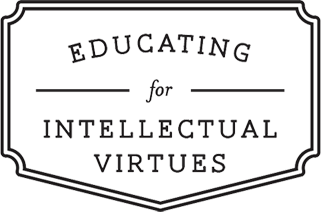
Objections to educating for intellectual virtues (with replies)
While the enterprise of educating for intellectual virtues has much to recommend it, this enterprise can also give rise to certain questions and concerns. What follows is a brief explanation of several of these concerns (along with brief replies). See Resources or order Deep in Thought: A Practical Guide to Teaching for Intellectual Virtues to learn more about this topic.
Do teachers really have time to educate for intellectual virtues?
This is an understandable concern. However, it turns on a mistaken view of what educating for intellectual virtues looks like. Importantly, educating for intellectual virtues is not something one does over and above educating for academic content and skills. For instance, it isn’t primarily a matter of teaching students about intellectual virtues. Rather, it is a matter of teaching academic content and skills in a particular way, namely, in a way that provide students with ongoing, well-supported opportunities to practice the virtues of good thinking. As this suggests, intellectual character education is less a matter of what one teaches and more a matter of how one teaches it. It involves teaching in ways that are thoughtful, active, relational, and rigorous.

Is intellectual character growth a realistic educational goal?
It might be wondered whether teachers can really hope to make a lasting impact on the intellectual character of their students, especially given the limited amount of time they spend with their students and the many other formative influences their students are subject to (e.g. family and friends). Whether such an impact is possible depends on how exactly one is thinking about it. If a teacher expects her students to become paragons of curiosity and open-mindedness after a semester or year under her tutelage, then she is bound to be disappointed. Accordingly, when educating for intellectual virtues, it is important to maintain realistic expectations. While we shouldn’t expect all (even most) of our students to become exemplars of intellectual virtue as a result of our teaching, it does not seem too unrealistic to think that, say, a group of teachers working together at a school site might, through hard work, collaboration, and mutual support, modify their pedagogical practices in such a way that a significant percentage of their students make notable progress in two or three key virtues during their time at the school (progress they wouldn’t have made under “normal” conditions). This is a reasonable but still very worthy goal. In short, if pursued thoughtfully, systematically, and collaboratively, it it is reasonable to think that teachers can help their students make worthwhile progress in intellectual virtues (Baehr, forthcoming).
In short, if pursued thoughtfully, systematically, and collaboratively, it it is reasonable to think that teachers can help their students make worthwhile progress in intellectual virtues.
Is it appropriate for teachers—especially public school teachers—to educate for intellectual virtues?
Words like “character” and “virtue” have a moral ring. This might lead some to conclude that educating for intellectual virtues is a questionable venture, especially within a public school setting. However, this worry conflates intellectual virtues with moral virtues. (It also suggests a rather limited understanding of the purpose of education, including public education.) To be sure, educating for intellectual virtues requires a commitment to certain values. But these values are primarily “epistemic” or intellectual in nature: they include things like knowledge, understanding, thinking, reasoning, wondering, and learning. Intellectual virtues are simply the character traits one needs in order to engage in these activities well. Given the academic focus of most schools, intellectual virtues and the values that go along with them are very much at home in most educational settings.

The real obstacles
The objections to intellectual character education noted above hold little weight. But this doesn’t mean that educating for intellectual virtues is without any real challenges and costs.
One cost concerns the fact that intellectual virtues aim at deep understanding of important subject matters (Baehr 2014). An intellectually virtuous person isn’t satisfied with mere memorization or rote problem-solving. She wants to understand how or why things are the way they are. She desires explanations; not mere assertions. It follows that educating for intellectual virtues requires educating for a genuine and deep understanding of whatever material is being taught. It favors “depth over breadth.” In some educational settings, this will not pose a problem; but in others—e.g. where the curriculum is “a mile wide and an inch deep”—tension may arise.
"... educating for intellectual virtues isn’t primarily a matter of teaching students about intellectual virtues. Rather, it is a matter of teaching academic content and skills in a particular way, namely, in a way that provide students with ongoing, well-supported opportunities to practice the virtues of good thinking."
While there is no getting around this feature of intellectual character education, the tension it causes can be mitigated in a couple of ways. First, with a little forethought and effort, most teachers can become more efficient with their class time—e.g. by doing an inventory of how they allot their instructional minutes and cutting out inefficient activities or by making better and more creative use of the work students do outside of class (e.g. “flipped” instruction). Second, in the United States, the advent of the new Common Core State Standards means that most teachers are now expected to cover less content and to focus more on activities like critical thinking, reasoning with evidence, and conceptual understanding. These emphases comport very well with an intellectual virtues approach.
A second obstacle is that for no small number of teachers, taking seriously the idea of educating for intellectual virtues will require a significant change in their fundamental educational beliefs, concerns, and practices. Such change is often quite difficult to bring about.
This is a serious obstacle. However, it can also be mitigated, especially through well-designed teacher education programs and professional development activities. Such training must respect teachers. It must give them an opportunity to think, wonder, explore, ask questions about, and even challenge this different way of approaching teaching and learning. When done carefully, respectfully, and patiently, exposing educators to an intellectual virtues educational model can have a powerful effect—one that makes them more open to aligning their fundamentals beliefs and practices with the goal of helping their students grow in intellectual virtues. (See this video for commentary from several teachers recently trained in an intellectual virtues model.)
References
Baehr, Jason. 2014. “Sophia,” in Virtues and their Vices, eds. Kevin Timpe and Craig Boyd (Oxford University Press, 2014): pp. 303-323.,
Baehr, Jason. Forthcoming. “Is Intellectual Character Growth a Realistic Educational Aim?” in a special issue of the Journal of Moral Education on “Virtue and Control: Lessons from East and West,” eds. Heather Battaly and Ryan Nichols.


